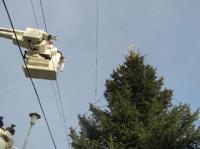Colorado Supreme Court to hear cases on Weld County redistricting, Xcel electrocution
The Colorado Supreme Court announced recently that it will hear appeals in multiple cases, including whether Weld County must follow state law when drawing new legislative districts and when utilities may be held liable for injuries caused by their power lines.
At least three of the court’s seven members must agree to take up a case on appeal.
The justices also voted to hear a third appeal questioning whether criminal defendants can be ordered to repay money law enforcement earmarked specifically for undercover drug purchases.
Finally, with only two justices expressing interest, the court narrowly turned down a negligence case in which the named defendant allegedly did not disclose a different party was actually liable for the plaintiff’s injuries until after the statute of limitations had passed.
Redistricting dispute
In 2021, the General Assembly enacted House Bill 1047, laying down requirements for counties to follow when completing their once-a-decade redrawing of commission districts. The law applied to only a handful of counties that elect commissioners by district, and provided direction for holding hearings, producing alternate maps and maximizing politically competitive districts.
Two local civic groups — the League of Women Voters and the Latino Coalition of Weld County — along with two voters filed suit following the adoption of new district maps in 2023. They pointed out Weld County had not followed HB 1047, under the belief that its home rule status meant it only needed to comply with the redistricting provisions of its own charter.

Weld County Commissioner Scott James, a close friend of the late Hugh McKean, gives a hug to Chair of the Colorado Republican Party Kristi Burton Brown after a ceremony preceding the lying in state of Colorado House Minority Leader Rep. Hugh McKean on Thursday, Nov. 10, 2022, in the rotunda of the Colorado State Capitol building in Denver, Colo. (Timothy Hurst/The Gazette)
TIMOTHY HURST/DENVER GAZETTE

Weld County Commissioner Scott James, a close friend of the late Hugh McKean, gives a hug to Chair of the Colorado Republican Party Kristi Burton Brown after a ceremony preceding the lying in state of Colorado House Minority Leader Rep. Hugh McKean on Thursday, Nov. 10, 2022, in the rotunda of the Colorado State Capitol building in Denver, Colo. (Timothy Hurst/The Gazette)
In a March 1 order, District Court Judge Todd Taylor agreed the county “failed to meet nearly every procedural requirement” the legislature imposed. He further found the General Assembly did intend for HB 1047 to apply to Weld County and its charter did not excuse it from following state law.
Recognizing Weld County would not likely have enough time to properly draw its commission districts, Taylor allowed the board to use its pre-2023 map for now. The county and the plaintiffs both filed appeals with the Court of Appeals, but on June 7, the plaintiffs petitioned the Supreme Court to stage a rare intervention and immediately hear the case itself.
The plaintiffs argued the normal appellate process would not likely yield a final answer in time for the 2026 county election and, in the meantime, Weld County has asserted it does not need to draw new maps until 2033, following the next census. The Colorado Attorney General’s Office submitted a brief in support of the Supreme Court’s intervention.
“The Attorney General has a statutory duty and interest in defending the laws of the State, specifically ensuring compliance with H.B. 21-1047 to protect equal voting rights for Colorado citizens and fairness and transparency in redistricting,” the office wrote.
The Supreme Court agreed to bypass the Court of Appeals and hear the case directly, including the issue of whether the plaintiffs could even sue in the first place.
The case is League of Women Voters et al. v. Board of County Commissioners.
Liability for electrocution
Francisco Cuevas, the owner of Outdoor Design Landscaping, was hanging Christmas lights at a Lakewood woman’s home in late 2017 when he received a debilitating shock from nearby power lines. On the theory that the close proximity of the power lines electrified the tree, Cuevas sued the homeowner and Xcel Energy for his injuries.
To determine whether Xcel could be held legally liable, Denver District Court Judge Stephanie L. Scoville looked to a section of the utility’s tariff, which sets the rates and terms of service for its customers. The tariff generally immunizes Xcel for “injury to persons” in close proximity to its power lines. Scoville concluded the language “was intended to limit the utility’s liability for more than just customers,” meaning it applied to Cuevas.

The tree on which Francisco Cuevas was hanging lights when he received a severe shock from the power lines. Photo from Cuevas v. Public Service Company of Colorado

The tree on which Francisco Cuevas was hanging lights when he received a severe shock from the power lines. Photo from Cuevas v. Public Service Company of Colorado
She also determined the High Voltage Safety Act precluded Outdoor Design Landscaping from holding Xcel liable because it had the duty to contact the utility before doing work near the power lines.
A three-judge panel for the Court of Appeals agreed state law barred Cuevas’ company, as the contractor, from bringing claims due to its failure to notify Xcel. But Cuevas himself was not precluded from doing so. The panel also disagreed that the tariff broadly immunized Xcel for injuries caused by its power lines to anyone, not just customers.
Both sides appealed to the Supreme Court. Xcel argued its tariff immunity for “injury to persons” meant what it said, without any limitation to customers alone. It also challenged the idea that Cuevas, as the owner of the company doing the light-hanging, had no duty to notify Xcel. Cuevas, meanwhile, disputed that the High Voltage Safety Act required his company to alert Xcel, as there was allegedly no intent to hang lights close to the power lines.
The Colorado Rural Electric Association and Black Hills Energy submitted briefs in support of Xcel, asking the Supreme Court to side with a more expansive interpretation of utilities’ immunity.
The justices agreed to hear all issues from both sides.
The case is Public Service Company of Colorado v. Outdoor Design Landscaping, LLC et al.
‘Buy money’
Nathan Hollis pleaded guilty to two drug distribution charges in which he sold narcotics on multiple occasions to an undercover officer in Weld County. Law enforcement waited for months after the first transaction to arrest Hollis, at which point the $1,640 Hollis received from the officer was gone.
Prosecutors sought to have Hollis repay the $1,640 in “buy money” as financial restitution. Hollis objected, noting Colorado’s restitution law for crime victims covers “money advanced by law enforcement agencies” and “extraordinary” investigation costs. To Hollis, the buy money fell into neither of those categories.
The Court of Appeals agreed with him.
The drug task force investigating Hollis was “not a victim under the restitution statute,” wrote Judge Ted C. Tow III last October. The buy money was “used solely to investigate drug-related crimes. And as officers of the Task Force testified, controlled buys occur several times per month using money specifically budgeted for that purpose.”
The attorney general’s office appealed to the Supreme Court, arguing it had never squarely addressed whether law enforcement agencies could recover buy money as a form of restitution. The office also contended there was conflicting guidance on the subject from the Court of Appeals, a characterization Hollis disputed.
The Supreme Court will review whether the appellate court correctly decided the question.
The case is People v. Hollis.
The surprise defendant
In August 2017, the driver of a DirecTV van rear-ended Nathan J. Mascarenas. The driver said his brakes and power steering failed in the moments before the collision. Mascarenas and his car suffered injuries.
Mascarenas alleged he attempted to settle with DirecTV for years, but wound up filing a negligence lawsuit against DirecTV and the driver just before the statute of limitations expired three years later. Shortly afterward — and after the statute of limitations had passed — DirecTV allegedly revealed for the first time that another entity was responsible for faulty maintenance on the van’s brakes days before the accident.
In late 2020, Mascarenas attempted to add the party, Phases Truck & Automotive Repair, to the lawsuit. El Paso County District Court Judge Catherine Mitchell Helton decided Mascarenas should have known about the cause of his injuries on the date of the accident, meaning the three-year window to sue Phases had closed.
“Filing the action so close to the expiration of the statute of limitations likely contributed to the fact that the Plaintiff was unable to discover the identity of Defendant Phases in a timely manner,” she wrote.
But the Court of Appeals saw differently. Nothing suggested Mascarenas knew about Phase’s involvement until after DirecTV made its disclosure nearly three years after the accident, explained Judge Rebecca R. Freyre.
“Indeed, Mascarenas’ prompt request through counsel to preserve evidence immediately after the accident and the substance of DirecTV’s responses raise the questions whether and to what extent Mascarenas made relevant diligent inquiries before filing his complaint. The answers to these questions,” she wrote, “must be determined by a jury.”
Phases asked the Supreme Court to review the case, arguing Colorado law recognizes a legal claim is actionable when a plaintiff, using reasonable diligence, knows about his injury and that someone else’s conduct was the cause. It is not a requirement that plaintiffs’ claims are triggered when they also know a defendant’s identity, added Phases.
Justices Melissa Hart and Maria E. Berkenkotter indicated they would have accepted the appeal to determine whether the discovery of a defendant’s identity should be a consideration when calculating a plaintiff’s window to sue.
The case is Phases Truck & Automotive Repair, Inc. v. Mascarenas.






